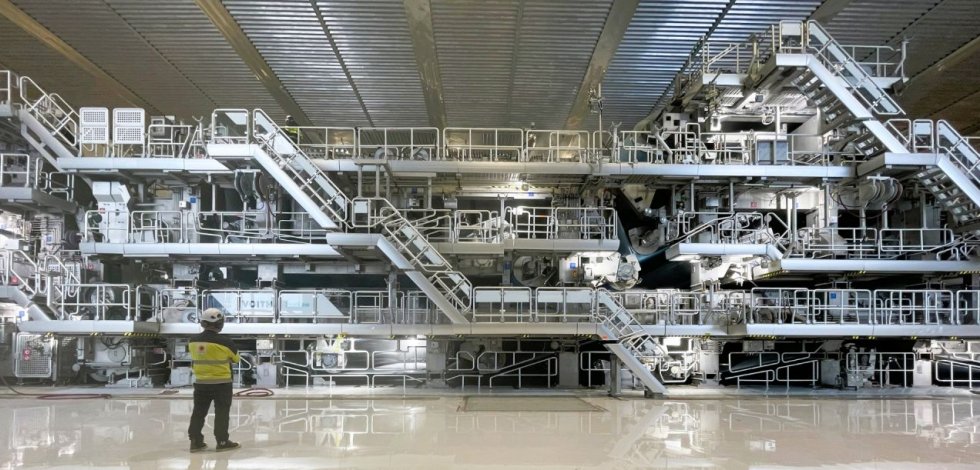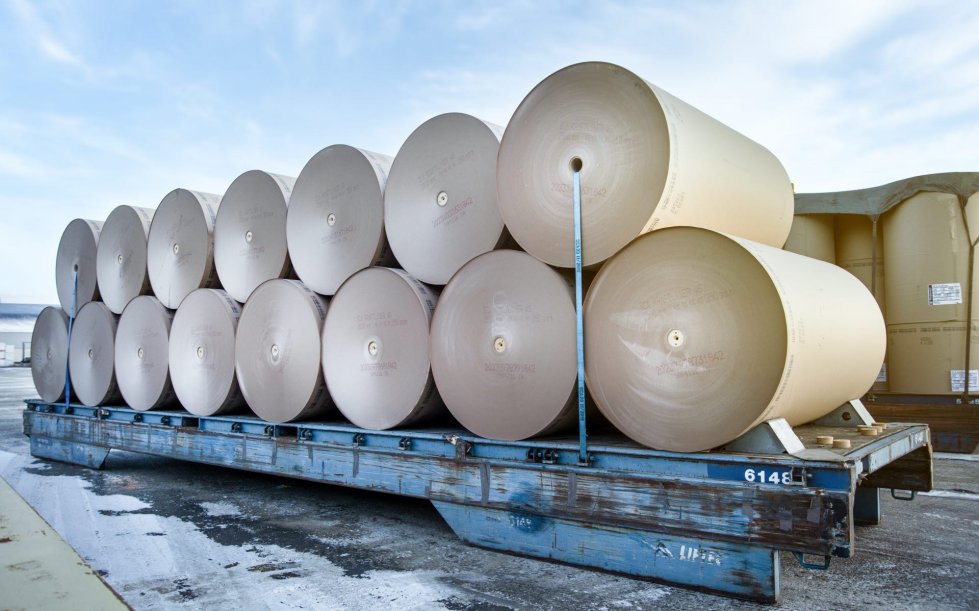|

Arauco Lays the Cornerstone for Its New Pulp Mill in Mato Grosso do Sul, Brazil
April 17, 2025 - On April 9, Chilean pulp producer Arauco celebrated the laying of the cornerstone at the site of its new pulp mill — "Project Sucuriú" — in Inocência, Mato Grosso do Sul state in Brazil. This marked end of earth moving phase and the official start of the construction phase of the 3.5 million tonne per year single-phase pulp mill.
The event was attended by national and local authorities including the Vice President of Brazil, Geraldo Alckmin, along with the entire Arauco team, headed by the CEO of the Arauco group, Cristian Infante, and the CEO of Arauco in Brazil, Carlos Altimiras. Valmet was represented by the South America Area management and the team members working for the project.
"We are a company with a global vision, utilizing a renewable resource essential to addressing the planet's challenges," said Cristián Infante, Arauco CEO. "In addition to generating economic value, we believe that our development must be guided by respect for nature and the well-being of people and communities. Therefore, we are promoting a safe, inclusive, and collaborative environment, ensuring that this project generates a positive transformation for Mato Grosso do Sul."
Geraldo Alckmin praised Arauco's significant investment in Brazil, paving the way for close collaboration between his government and Arauco. He highlighted the impact this project has on the region, generating employment and various benefits for the local economy.
"This is the world's largest single-stage cellulose project. Count on us for the new Brazilian industry, research, development and innovation. The bi-oceanic route will create a historic connection with the Atlantic and Pacific, an extraordinary gain for this region."
Celso Tacla, President of Valmet South America, added, "With the Arauco Sucuriú project, the largest and most modern pulp mill in the world, we are creating the future aligned with our commitment to sustainable development and environmental preservation. This plant has been carefully planned and designed to ensure the highest availability and production efficiency. Its capacity definition combines technical and economic aspects to maximize production, adopting the most modern and advanced technologies for pulp production, automation, and control."
The large number of Valmet representatives were happy to celebrate this event and continue the intensive work for the project.
"This is the most important project in Valmet's history. It will be the largest mill in the world and the most modern technology," said Fernando Scucuglia, Director of Pulp and Energy for Valmet.
Valmet Scope of Delivery
EPCC delivery of all key process islands and mill automation:
- 6 wood handling lines
- 2 cooking and fiberlines
- 3 pulp dryers, 8 baling lines
- Evaporation plant
- Recovery boiler with ESPs
- Recausticizing
- Lime kiln with biomass dryer and gasification
- NCG collection and handling
- Valmet DNAe DCS system
- Mill wide optimization
- Valves and valve automation
Valmet has a global customer base across various process industries and is a leading global developer and supplier of process technologies, automation, and services for the pulp, paper, and energy industries.
SOURCE: Valmet |
|

Stora Enso Starts-up Converted Consumer Board Machine at Oulu Mill in Finland
March 19, 2025 - Stora Enso's new consumer packaging board line at its Oulu pulp and paper mill in Finland has started production ramp-up. The first customer deliveries are expected in the second quarter of 2025.
In October of 2022, Stora Enso announced its decision to convert the remaining idled paper machine (PM 6) at the Oulu site into a highly flexible consumer packaging board line for folding box board (FBB) and coated unbleached kraft (CUK), with an annual capacity of 750,000 tonnes. The project is being completed according to the original timeline and budget of approximately EUR 1 billion.
Voith performed the full-line paper machine conversion for Stora Enso.
The new packaging board line is expected to reach EBITDA breakeven by the year-end 2025 and full capacity during 2027, at which point annual sales are anticipated to be approximately EUR 800 million.
Renewable packaging is Stora Enso's largest growth segment. The investment supports the Group's strategy by further strengthening the customer offering in the growing FBB and CUK segments. The targeted segments are frozen, chilled and dry food, as well as beverage multi-packaging, primarily for customers in Europe and North America.
"The new line will be the most modern and cost-efficient in Europe," stated Hans Sohlström, President and CEO of Stora Enso. "Through this investment, our Oulu unit will become Stora Enso's largest production facility, an integrated mega-site, focusing on future packaging board grades and featuring a flexible production setup. This will strengthen profitability and competitiveness for our consumer board and containerboard offerings. It will also enable us to optimise production at our other sites to unlock further profitable growth, for example in liquid packaging board at our Skoghall site in Sweden."
Following this investment and the earlier conversion completed in 2021, the Oulu site will produce unbleached pulp, kraftliner, and consumer board in both reels and sheets.
The Oulu mill employs a total of approximately 650 people.
Wood consumption at the Oulu site will increase by approximately one million cubic metres to approximately 3.5 million cubic metres per year. The site will use local wood supply in production as well as pulp from Stora Enso's Enocell site in Finland and Veracel site in Brazil.
In addition, the announced acquisition of the Junnikkala sawmills would further strengthen cost-efficient, long-term supply of raw materials such as wood chips, pulpwood, and biomass.
Stora Enso is the leading provider of renewable products in packaging, biomaterials, and wooden construction, and one of the largest private forest owners in the world. Stora Enso has approximately 19,000 employees. Sales in 2024 were EUR 9 billion.
SOURCE: Stora Enso |
|

Cepi Calls on EU Commission to Continue Negotiations on US Tariffs to Avoid Supply Chain Disruptions
March 18, 2025 (Cepi) - The imposition of import tariffs by the US would have a significant impact on EU pulp, paper and board exports. While a positive issue to transatlantic negotiations may still be possible, Europe's pulp and paper industry in coordination with the European Commission has been preparing for the effects of a potential EU retaliation.
On March 12, the United States government-imposed tariffs on steel and aluminium and signaled that it may impose tariffs on a broader range of EU goods, potentially including pulp and paper products, in April. Cepi, representing the European pulp and paper industry, is now taking part in a consultation launched by the European Commission on the list of American products targeted by European retaliation measures.
The list of products presented is open to consultation by industry representatives until 26 March. It will then be submitted to EU member states for approval. The Commission is aiming for entry into force in mid-April.
Cepi advocates for a 'negotiation first' approach. But in the event negotiations fail and US tariffs on EU exports of pulp, paper or board would be imposed, Cepi urges the EU Commission: to respond quickly, vigorously and in a proportionate manner with EU restrictions on imports of US goods and services.
If, however, US tariffs do not cover EU pulp, paper and board products, such EU retaliation should similarly exclude US pulp, paper and board products, to exclude from such EU retaliation list products that risk being in short supply in the EU, and to monitor and address possible trade flows from third countries that may flood the EU market because of US tariffs, including by means of using EU trade defence instruments to protect the EU industry.
Jori Ringman, Cepi Director General, commented, "Cepi regrets the imposition of US tariffs and the increased risk of a trade war and supply chain disruptions this creates. Against this background, Cepi calls on the European Commission to continue negotiations to avoid further supply chain disruptions and prevent the imposition of additional tariffs."
The EU and the US are very important trade partners in pulp, paper and board. The EU imports around 900,000 tonnes per year of pulp from the US and close to 600,000 tonnes of paper and board. On the contrary, the EU exports a lot of paper and board to the US — about 1.6 million tonnes per year of paper and board, and around 350,000 tonnes of pulp.
Since a multilateral agreement of all major pulp and paper producers in January 2004, there have been no import tariffs on both sides of the Atlantic, to the benefit of both US and EU businesses and consumers.
"It is not just about the competitiveness of our sector, it is about the EU and US consumers who need basic hygiene products, EU and US workers in factories losing their jobs, and ripple effects on the wide range of sectors using paper packaging on both sides of the Atlantic," Ringman concluded.
Brussels-based Cepi (Confederation of European Paper Industries) is the European association representing the paper industry. Cepi is a non-profit-making organisation.
SOURCE: Cepi |
|

UPM to Reduce Paper Capacity in Germany; Streamline Its Structure to Ensure Performance
March 11, 2025 - UPM continues to selectively align its paper capacity with profitable customer demand to ensure performance and therefore plans to permanently close its paper mill in Ettringen, Germany, reducing the annual capacity of uncoated mechanical paper by 270,000 tonnes during July 2025.
Should the plans be implemented, the number of positions affected in Ettringen is estimated at 235. The participation process with the workers council will start immediately in line with local legislation.
“In a dynamically changing market that has been characterized by overcapacity for years, operational competitiveness is key to underpinning our long-term commitment to the still sizeable graphic paper markets and remaining the reliable partner our customers know us to be,” said Gunnar Eberhardt, Executive Vice President, UPM Communication Papers.
“With the plans announced today, we are continuing to selectively adjust our paper capacity to a profitable customer demand. This would ensure an efficient and flexible use of our remaining paper assets. While we see these planned changes to be necessary to safeguard our strong position and future, we are aware that today’s announcement demands much from our employees in Ettringen. We aim to handle the restructuring measures in a socially responsible way and will engage now into dialogue with employee representatives,” Eberhardt said.
Additional Measures with Clear Focus on Operational Efficiency
As one of the largest producers of graphic papers, UPM Communication Papers is constantly working to remain relevant and competitive in the long term. Even when production capacities must be adjusted to meet customer demand, the global paper market remains sizeable, presenting opportunities for agile and competitive players.
By benchmarking and sharing best practices across all mills, UPM Communication Papers aims to enhance efficiency, improve cross-departmental flexibility, and streamline organizational structures within its mill operations in Augsburg, Schongau, Kaukas, Kymi, Rauma, Jämsänkoski, Blandin and Caledonian.
In addition, UPM sees further optimization potential by centralizing processes and organizational structures within logistics operations in the German mills.
In order to realize further benefits of a scalable and efficient Sourcing organization, UPM plans to discontinue the Central European Mill Support (CEMS) team and streamline its Mill Sourcing and RCP Sourcing teams according to new capacities.
All affected mills and functions will follow up with their own implementation steps during 2025, and the company is committed to working closely with affected employees, handling possible employment actions in accordance with local legislation.
According to the plans, UPM estimates approximately 227 positions to be affected in its mill organizations and functions.
Antti Hermonen, Senior Vice President Operations, UPM Communication Papers, stated, “With the planned measures we improve cost efficiency and competitiveness, while ensuring a reliable supply from our production locations in Finland, Germany, the UK and the USA.”
Considering all planned changes announced today by UPM Communication Papers, there would be a total of 462 positions impacted: 107 in Finland, 314 in Germany, 34 in the UK and 7 in the USA.
These plans are a continuation of necessary steps to proactively align with customer demand and ensure competitiveness. UPM would recognize restructuring charges of EUR 74 million (EUR 60 million cash impact and an impairment of EUR 14 million) as items affecting comparability in its Q1 2025 result. The planned actions are estimated to result in annual fixed cost savings of EUR 39 million.
UPM Communication Papers offers the industry’s widest portfolio for newspaper, magazine, marketing and book printing as well as for home and office applications. With headquarters in Germany, UPM Communication Papers employs approximately 5,000 people and has 10 modern paper mills globally. Its annual production capacity is 4.3 million tonnes of graphical paper.
SOURCE: UPM |
|
|